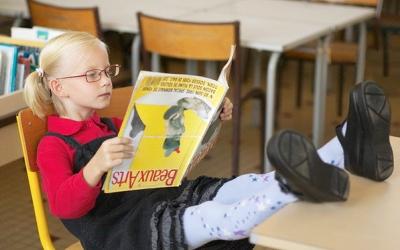The Rights of the Reader, and why I’m a fan of Daniel Pennac
Pennac just didn’t get schooling at first. He struggled to the point that people wrote him off as a dunce, as a hopeless case… until he discovered the joy of reading, which lifted him out of the educational quagmire and into a wonderful world of escape. He attributes authors such as Charles Dickens, Robert Louis Stevenson and Alexander Dumas with luring him into the world of reading and keeping him hooked enough to want to know more.
Inspirational
It was his very demoralizing experience at school that inspired Pennac to train to become a teacher himself, and to help countless other children who just didn’t get academia in the same way as he didn’t. As he says in the Independent’s feature: ‘The teacher’s job… is to take up these stunned creatures, to locate some spark of life and nurse them out of their educational comas; to find some kind of access-point to each student.’
It is this way of thinking that sparked Pennac’s much-praised book The Rights of the Reader. Rather than taking an officious approach to reading, saying that children must read X amount of minutes or hours a day to develop their literacy skills, he argues for a child’s right not to read. He has ten main ‘rules’ that would attract any reluctant reader to pick up this very book and start thumbing through the pages. Perhaps put them up at home and see what your child thinks of:
1. The right not to read.
2. The right to skip.
3. The right not to finish a book.
4. The right to read it again.
5. The right to read anything.
6. The right to mistake a book for real life.
7. The right to read anywhere.
8. The right to dip in.
And there is a warning at the end to not make fun of people who cannot read… or they never will.
Kids love it
When I was working with children with literacy problems, I told them all about this book. Their eyes nearly popped out their heads. Not read something all the way through? Skip pages? Not finish a book? These children had been forced to read dull Biff and Chip books in a desperate attempt to boost their reading age but all this had done was make their loathing of the written word even worse. Not only were they visibly behind their peers, they also were being fed garbage that was of no interest to them whatsoever.
What would tickle their fancy? I tried poetry with one child (who loved Ogden Nash and wouldn’t put the book down at the end of the session). I tried song lyrics with a fan of One Direction, and let her follow to the music. With two dyslexic boys, I used a picture book The Mole Who Knew It Was None of His Business, which went down a storm and immediately became their favourite book. This was thanks to the writings of Daniel Pennac who says:
‘He won’t learn English the usual way? You try nursery rhymes, or nonsense verse, quotes from Woody Allen or Churchill, or get him acting out scenes in a play or singing Beatles songs. The good teacher, faced with a “dunce” – a pupil failing to engage with learning, a stunned sparrow – has a passion for finding these points of access, will try as many as it takes. Also, good teachers go to bed early.’
I fail on this last point.
Please do read The Rights of the Reader and, if your children show an interest, give them a copy too. It’s not a beefy piece of academia. It’s a short text, with short chapters and very funny writing. And let me know if you too become a fan of Monsieur Pennac. I think there are many of us out there.

